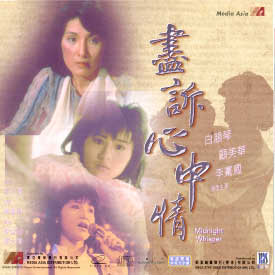Midnight Whispers a.k.a.
Cascading Feelings

Director: Michael Mak; David Lai
Year: 1988
Rating: 7.5
This very intriguing
melodrama from 1988 seems to have somehow fallen through the cracks into
obscurity – but I think it is well worth a look for those interested in a
certain actress and for those that enjoy socially relevant dramas. The film
touches on a number of social issues – women’s standing in HK society, the
wife’s standing within the family unit, the Cultural Revolution and the cultural
clashes between HK and the Mainland.
These issues are tackled within the framework
of a mother’s undying love for her daughter and though it does enter into
the territory of melodrama it does so with a measure of subtlety. The writing
could have been better – but even so as the story progressed I found myself
– much to my surprise I should add – getting very engrossed and feeling something
for a woman who sacrifices so much.
The structure of the story is a bit clunky
as it is told via flashbacks through a radio talk show, but by the end it
comes together nicely. Midnight Whisper is a radio talk show in which listeners
call in to discuss their lives. One evening a gentleman calls in to say that
he has been in love with a woman for a very long time – but that his love
seems hopeless – she has become the mistress of another man for the love
of her daughter. The daughter then calls in to say that the man is
lying and that her mother is a terrible woman. Finally, the next day the
distraught mother calls in to tell her story – and the film unfolds with
her narration.

In a very restrained and fine performance Josephine Koo plays the mother.
She is best known to most of us as the wife of Kenneth Tsang’s character
in Police Story III, but was considered to be a fine dramatic actresses in
HK and had small roles in Red Dust and A Fishy Story. Here, she wonderfully
captures the innate nobility of this woman who manages to keep her head up
no matter how low she has to sink – until it finally feels like too much
for her to handle.

In a rare dramatic performance, Moon Lee plays the daughter. She does get
to whack a few schoolgirls around but otherwise it is straight drama and
Moon is very effective. She actually plays a 15-year-old girl – even though
she must have been around 22 years old at the time. The character goes through
a number of changes and Moon does them all well – and has a few scenes that
any Moon fan will treasure. This film was made right after Moon's career
making appearance in Angels - but it was a last dramatic role before she
was pigeon holed into action roles. Not that I’m complaining – I love her
in those action roles – but I have read of her wistfully talk of being able
to do dramatic roles – and now I understand why.

As the mother tells her story, it begins with her daughter’s birth in 1970.
Her doctor advised her that it could kill her – and that she should have
an abortion – but she had it anyway. Both she and her mother-in-law raise
the little girl – she having to discipline the girl, the grandmother spoiling
her. Her husband is cheating on her – even at home – and tells his wife “it’s
cheaper than a motel room” and the grandmother chimes in “that every man
needs to have multiple women”. Josephine applies for a divorce and is able
to get the child in the settlement – but the grandmother says “this child
is a Lee” and kidnaps her and returns to her home in the Mainland.

Here though life has changed since she left and granny has not kept up with
the political winds. The Cultural Revolution is going on and she mistakenly
praises Deng Xiaoping who has just been condemned by the Communist Council.
Granny is attacked as a capitalist roadie and as having been poisoned by
the Gang of Four. She and the little girl are sent to the farming /labor
camp far to the north. Here life is extremely harsh – and everyone picks
on the girl for her background.
As the years pass, Josephine never stops
searching for her daughter – and finally tracks her down in 1986 – but under
the table payments have to made to Communist officials to get her daughter
out (now being played by Moon). To raise the money she has to agree to become
the mistress of this disgusting triad pig who treats her just like property.

She gets Moon back, but this is just the beginning of her problems as Moon
adjusts very poorly now to life in HK – she feels like she belongs nowhere
– not in the Mainland and not in HK – and begins to take up with bad elements.

The film covers a lot of territory and a lot of years – but it remains focused
and slowly spins an emotional web about you. As the world starts to close
in on the mother, her hopelessness and sadness is very compelling.







